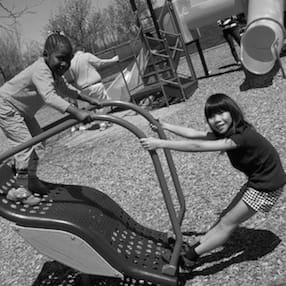Creating Playable Cities
The well-being of society begins with the well-being of kids. And kids need active and balanced play—play that gets their legs moving and hearts pumping, but also helps them develop social and problem-solving skills. Kids who engage in physically active play at least two or three times a week and spend less time in front of the TV, for example, are far less likely to be overweight, according to one study.
But kids today play less actively than ever before. That’s partly because they have limited access to safe play areas, shorter recess times, and a growing number of sedentary entertainment options. It’s also because of invisible psychological barriers.
ideas42 has identified three major behavioral obstacles to kids engaging in the right amount of balanced and active play each day by interviewing families living in low-income communities who may facer steeper challenges to play due to limited time and financial resources. Using a behavioral approach, we found that parents and caregivers may not even think about play because it’s not a planned event, like school or a soccer game. That’s especially true given that many parents have busy schedules and daily obligations.
We also found that the benefits of play may not be immediately apparent, so parents and caregivers may lack feedback showing their kids benefiting long-term from playing. And even the most well-intentioned parents may be deterred by mundane tasks related to active play, such as packing bags, changing clothes, and providing transportation.
We used these findings to develop innovative ways of integrating active play into kids’ daily lives—reclaiming time that would otherwise be spent on sedentary activities—and making playgrounds more accessible and appealing to entire families. We hope the results, outlined in a white paper titled “Using Behavioral Economics to Create Playable Cities,” will be used by policy-makers, planners and businesses to promote active play in cities.
The paper was the result of a collaboration with KaBOOM!, a non-profit dedicated to increasing access to play, particularly for the 16 million children living in poverty in the United States. It was presented at the KaBOOM! Playful City USA Leaders’ Summit in Chicago, as well as the 2015 SXSWedu conference in Austin.
ideas42 will be working with KaBOOM! over the next several months to identify and implement behaviorally informed solutions to increase play and well-being for kids everywhere.
Interested in learning more about this work applying behavioral science to a crucial social problem? Reach out to us at info@ideas42.org or tweet at @ideas42 to join the conversation.









